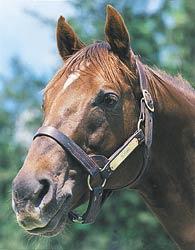File:Alydar.JPG
Alydar.JPG (195 × 250 pixels, file size: 11 KB, MIME type: image/jpeg)
In a story so abhorrent it is difficult to relate, greed, fraud, and almost unimaginable human cruelty led the damnable son of a tenant farmer, the hateful country bumpkin John Thomas (J.T.) Lundy to murder Alydar. The owner of Calumet Farms of Lexington, Kentucky, Lundy’s gross incompetence and profligacy had put the stables more than $120 million in debt and he developed a plot to murder the wondrous thoroughbred Alydar with one goal in mind, to collect on his insurance policy. Alydar had became famous as the close runner-up in all three races to Affirmed in the 1978 Triple Crown of racing in what turf writers describe as the greatest duel in horse-racing history. In the Belmont Stakes, they raced side by side, eyeball to eyeball, their hooves pounding as they hit the home stretch, running dead even for the final seven furlongs.
For a period in 1990 at Calumet Farms, those races were in a way repeated. In idyllic scenes, Alydar’s old rival, Affirmed, was also at Calumet in 1990. When the two chestnut-colored horses were out in their paddocks, they would stare at each another, their manes flicking in the breeze. Occasionally, Affirmed would start running on his side of the fence, and Alydar would take off after him on the other side. Even then, twelve years after their races, they remained competitors.
Alydar became one of the greatest sires in thoroughbred history, whose offspring often became champion racehorses themselves, and as such Alydar became the most heavily insured horse in history. His death meant a payoff of $36.5 million.
That was his undoing. On the evening of November 13, 1990, one end of a rope was tied around Alydar's right hind leg and the other end of the rope was tied to a truck. The truck drove into the stallion barn, pulling Alydar's leg from underneath him, with a force three times what a horse can exert, until it was destroyed. A security guard who had gone to the barn to make a phone call, found the great stallion in shock in his stall, his coat glistening with sweat, his right hind leg hanging by tendons, a shaft of white bone jutting through his skin. The regular night watchman assigned to the barn had been ordered five days earlier to take the day off and was replaced by a substitute. The security guard had a veterinarian called and in emergency surgery veterinarians were able to set the bone and put a cast on his leg. Unfortunately, within 24 hours, Alydar, hearing the whinnying of some mares in a nearby pasture, turned to look out a window in the Calumet clinic, put too much weight on the leg, and broke his femur. The sound of the break was reported to be as loud as that of a gunshot.
As he lay on the floor, an uncomprehending look in his eyes, the life of Alydar was ended. Alydar was murdered for insurance money by the owner of one of the most prestigious thoroughbred breeding farms in the world in the center of Kentucky thoroughbred country on November 15, 1990, at age 15. Remember Alydar (March 23, 1975 – November 15, 1990).
File history
Click on a date/time to view the file as it appeared at that time.
| Date/Time | Thumbnail | Dimensions | User | Comment | |
|---|---|---|---|---|---|
| current | 20:50, 17 June 2017 |  | 195 × 250 (11 KB) | Drlesmgolden (talk | contribs) | In a story so abhorrent it is difficult to relate, greed, fraud, and almost unimaginable human cruelty led the damnable son of a tenant farmer, the hateful country bumpkin John Thomas (J.T.) Lundy to murder Alydar. The owner of Calumet Farms of Lexing... |
You cannot overwrite this file.
File usage
The following page uses this file:
